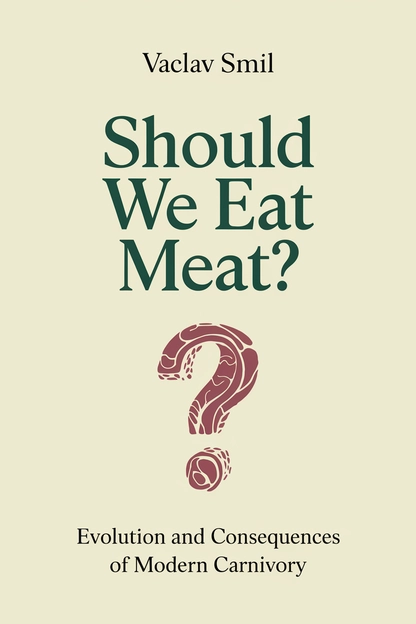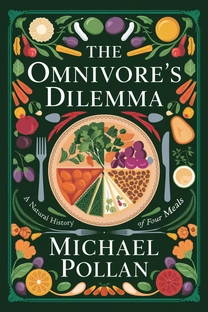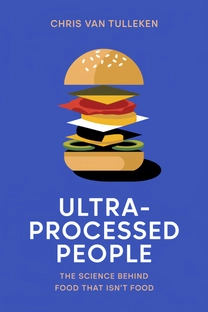
Should We Eat Meat?
Evolution and Consequences of Modern Carnivory
by Vaclav Smil
Brief overview
This book explores how and why humans began eating meat, how modern meat production has changed, and the impacts these trends have on resources, the environment, and our health. It covers the history, science, and cultural elements that shape our meat-centric diets. Readers will come away with a nuanced understanding of meat’s role in both individual well-being and global sustainability.
Introduction
Meat is often at the center of many daily meals, yet its significance goes far beyond our plates. For thousands of years, it has played a pivotal role in defining human diets, cultures, and celebrations. Today, modern production methods have created a surplus of cheap, accessible meat, fueling debates about health and sustainability. This introduction sets the stage for exploring the multifaceted story of our carnivorous habits.
We begin by acknowledging that meat consumption is neither purely beneficial nor entirely negative. On one hand, it can be a rich source of nutrients. On the other, it can strain our environment and raise ethical concerns. Understanding these layers is key to making informed choices about the food on our plates.
In subsequent pages, we will delve into the evolutionary underpinnings of meat eating, the rise of industrial farming, and the controversies surrounding intensive production. We will also explore emerging alternatives, from plant-based options to lab-grown tissues, that promise to change our relationship with meat for generations to come.
Through this summary, you’ll gain insights into how history, biology, economics, and technology intersect in a single, everyday food choice. Whether you’re a devoted carnivore, a curious flexitarian, or a committed vegetarian, the discussion here aims to broaden your perspective on the modern meat dilemma.
From Evolution to Modern Meals
Humans did not always have the luxury of readily available meat. Early hominins scavenged and later honed their hunting skills, using cooperative techniques to secure precious protein. With the development of tools, meat grew more central to our diets, supporting higher calorie and nutrient needs.
These hunting practices shaped social bonds and even contributed to the growth of our brains. Children and adults needed complete proteins and fats for proper development, making meat invaluable for survival in many environments. Eventually, domestication of sheep, goats, and cattle replaced the unpredictability of hunting with more consistent meat supplies.
Over time, demand for meat steered cultural norms and food traditions. Hunting large game became a symbol of power and status, whereas in some places, meat was scarce or only for special ceremonies. This variability laid the foundation for the diverse patterns of carnivory we see among global societies today.
By the modern era, technologies for trade and refrigeration pushed meat from local specialty to international commodity. The transition from small-scale herding to industrial production then set the stage for our current debates over health, environment, and morality.
What is Should We Eat Meat? about?
In "Should We Eat Meat? Evolution and Consequences of Modern Carnivory," Vaclav Smil delves into the intricate connection between humans and meat consumption. This book traces our journey from primitive hunters to modern societies where meat is a dietary staple. Through a comprehensive exploration of history, environmental impacts, health concerns, and future trends, Smil invites readers to reevaluate their perceptions of meat in today's world.
The book captures the complex tapestry that meat represents in global cultures. While it highlights the nutritional prowess of meats, it also brings to light the environmental ramifications of the massive industrial meat production. Smil provides insights into how modern practices have altered landscapes worldwide, posing challenges to sustainability. By envisioning a balanced approach to meat consumption, this book serves as a catalyst for meaningful dialogue on responsible dietary choices.
"Should We Eat Meat?" holds significant value by challenging myths and presenting factual, evidence-based perspectives. As debates rage on about ecological footprints and ethical concerns, Smil's work stands as a beacon, offering practical pathways to rethink and reshape these age-old dietary traditions. Whether you're a researcher, policy-maker, or curious reader, this book is an indispensable resource for understanding meat through an evolutionary and modern lens.
Review of Should We Eat Meat?
Vaclav Smil's "Should We Eat Meat?" is an enlightening exploration into a topic as old as human civilization itself. With a clear and grounded writing style, Smil unpacks the historical significance of meat in human diets and societal structures. The book provides an unflinching look at how industrial meat production, while revolutionarily efficient, raises ethical and ecological questions that ripple through global food systems.
One of the key strengths of Smil's work lies in its balanced analysis. He deftly covers the nutritional benefits of meat while not shying away from its environmental downsides, offering readers both sides of the conversation. Practical takeaways include what consumers can do to reduce their impact without abandoning meat entirely. The exploration of alternative protein sources—from lab-grown meat to plant-based options—adds a forward-thinking dimension to the narrative.
The book is engagingly accessible, blending scientific insights with common-sense explanations that demystify complex topics. It speaks to varied audiences—from health-conscious individuals to environmental advocates—culminating in a recommendation to embrace a mindful, moderated approach to meat consumption. Smil's "Should We Eat Meat?" is a must-read for those committed to informed choices and sustainable living.
Who should read Should We Eat Meat??
- Environmentalists seeking data-driven insights into the impact of meat production on climate change and sustainability.
- Health enthusiasts or dieticians wishing to understand the nutritional spectrum of meat and its alternatives.
- Policy-makers interested in gauging the socio-economic influences of global meat consumption patterns.
- Culinary professionals and food industry leaders aiming to explore evolving food production technologies and trends.
- Academics and students in fields of anthropology or nutrition science, exploring evolutionary and cultural implications of diet.
About the author
Book summaries like Should We Eat Meat?
Why readers love Mindleap
10-Minute Book Insights
Get the core ideas from the world's best books in just 10 minutes of reading or listening.
Curated For You
Discover your next favorite book with personalized recommendations based on your interests.
AI Book ExpertNew
Chat with our AI to help find the best book for you and your goals.
Reviews of MindLeap
Love how I can get the key ideas from books in just 15 minutes! Perfect for my busy schedule and helps me decide which books to read in full.
Alex R.
The summaries are incredibly well-written and the audio feature is perfect for my commute. Such a time-saver!
Jessica M.
Great app for personal growth. The insights are clear and actionable, and I love how they capture the essence of each book.
Chris P.
The app is beautifully designed and the summaries are top-notch. Definitely worth every penny!
Sarah K.



